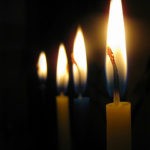 This is a guest column by Rabbi Da-vid Rosenthal, from Aish Minnesota.
This is a guest column by Rabbi Da-vid Rosenthal, from Aish Minnesota.
Yep, it’s that time of year again. “Tis the season to be jolly” and all that. I remember being in London about 8 years ago and constantly hearing George Michaels singing “Last Christmas, I gave you my heart…” It has stayed in my head for weeks afterward!
So how do we as Jews relate to this non-Jewish festival? Aside from the lesson to avoid the danger of commercializing our festivals, is there anything we can reflect on, some wisdom to be gained?
Is there anything intrinsically different between Jewish and non-Jewish festivals?
Many non-Jewish festivals are considered days of commemoration for past events. For example, Christmas is said by some to be the remembrance of the day of Jesus’ birth. Mawlid is the name of the day for celebrating Muhammad’s birthday.
Most people view Jewish festivals in much the same light. Pesach (Passover) is the time for commemorating the Jews leaving Egypt. Chanukah is for remembering our defeat over the Greeks.
However, when one delves into the classical sources, there seems to be something a little deeper going on.
A few parsha’s ago, when the angels came to save Lot from the impending destruction of Sodom, we find Lot serves his guests Matzah. Now a simple calculation will show that the story of Pesach wouldn’t occur for at least another few centuries (Jacob’s sons died before the enslavement of Egypt, and Jacob was the grandson of Abraham – Lot’s uncle). So what was Lot doing eating Matzah before the subjugation of Egypt had happened?
Hold onto your seats.
Let’s examine time for a second (no pun intended).
The secular view of time is linear.
That means to say time moves forward, never repeating itself, or doubling back. That’s the standard thought process in Western society. The Buddhist view of time is actually circular. Time consists of era’s or ages that repeat themselves, “The Wheel of Time”.
The Jewish view of time is actually somewhere in-between. One might say it’s a Spiral. That means to say, although there definitely is progress, and things advance forward, the passage of times winds around, coming over the same areas as it did the year before, albeit at a further point in time. This is true both on a macro level and a micro level. So for example, the week is a micro spiral in that each week we pass over Shabbat, the same Shabbat of creation; and on a macro level, every Rosh Hashanah, we pass by that same beginning of creation, the beginning of the year.
To make it a little more tangible, imagine a circle made of seven spotlights, one of them much brighter than the rest. Now imagine a glass spiral staircase built above the spotlights, one stair per light. As you go up the staircase, one step per day, a different light is shining on you as you walk from step to step. The brightest light is that of Shabbat, and every seventh step you take, you re-experience the light of Shabbat. So although you are progressing – i.e. getting higher – you never-the-less are connected to that very first set of lights.
That more or less is the Jewish view of time.
It’s not that we are celebrating an historic event that happened a long time ago. Rather, we are re-experiencing the power or light of that day, here in the present.
G-d so to speak put a spiritual power into the cycle of life, and as we progress through the year, we tap into these “lights”, in order to grow through each festival. Each festival has it’s own unique “light,” it’s own energy.
The leaving of Egypt was a time of spiritual liberty. G-d delivered us both physically and spiritually from the oppression of Egyptian rule. We aren’t meant to simply recall the events in Egypt, we’re meant to relive them, so that we too can tap into the “Freedom” that is contained within the power of the time. Freedom to break out of our limitations whether emotionally, or metaphysically.
When Lot was serving his guests Matzah, it was due to his sensitivity to the dynamics of time. The power of the Exodus was put into the cycle of time from the beginning of creation, and was merely waiting to be tapped into.
I hope this sheds some light (you’ll excuse the irresistible pun) on the Jewish view of time, and the weight this lends to the Jewish festivals – they are not just commemorations or rituals, they are here to be relived today!
(Photo: Heather)

